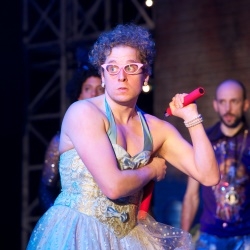A Midsummer Night's Dream (Plymouth)

© Manuel Harlan
The course of true love never did run smooth.
The quirky all-male Shakespeare group Propeller, in association with the Touring Partnership, is doing the rounds again, but this time, disappointingly, with just one offering.
A Midsummers Night’s Dream is given the Edward Hall treatment (first aired in 2003) and the result is mostly fun as the course of love is knotted, unpicked and generally mucked about with by an out-of-sorts King of the Fairies.
Played for laughs with plenty of slapstick, impeccable timing and some fab interpretation, there is plenty to engage and amuse a mostly young audience. In fact, it is rather heartening to see that connection from teems of school parties.
A slightly wooden and overplayed first half, in which the "bounce" seems rather contrived at times and wordy monologues a tad tedious, gives way to a fast and laugh-out-loud second half, restoring the faith in this innovative company. And it is only fair to point out this is the start of the tour, so the depth and slickness is bound to increase.
Played on Michael Pavelka‘s seemingly knitted white set adorned with little more than ladders and suspended chairs with changes wrought by Ben Omerod‘s psychedelic lighting, 14 blokes populate the stage with mischief-mongering fairies, Hooray Henry toffs, yokels and magic potion-crossed lovers.
Chris Myles cranks up the slapstick with the gift of a part of Bottom, Joseph Chance‘s Puck is sinuous and omnipresent in tutu, striped tights and ruby slippers, while Alasdair Craig‘s Thisbe is ridiculously hilarious (as indeed are all the Mechanicals in the outrageously silly play within a play).
Dan Wheeler makes a believable Helena (one forgets the crewcut and strong jaw), debasing herself to hold on to lost love and in particular in her confusion as Oberon’s meddling turns Demetrius (Arthur Wilson) and Lysander (Richard Pepper)’s attentions to her – to the chagrin of Hermia (the versatile, two-part player Matthew MacPherson) – in the best Act III quarrel scene I have seen – great clarity, pace and understanding.
And Propeller’s trademark musicality abounds with great harmonies, percussive statement – and just what is that wonderful whiney-sounding, lampstand-looking instrument?
It is just a shame there is no counterpointing more serious piece, as has been Propeller’s MO to date, to spike the guns of the "making Shakespeare accessible" critics.
– Karen Bussell










